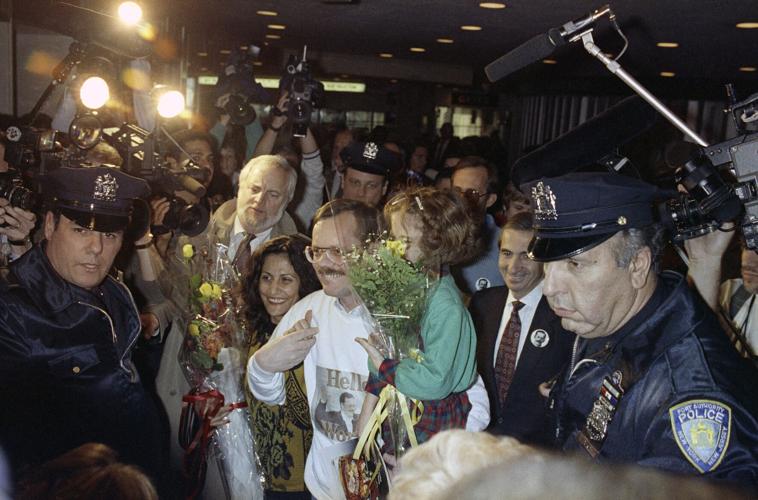
I would say this is a particularly dangerous time to be a journalist. But there has never been a time when it wasn’t particularly dangerous to be a journalist.
Since the Oct. 7 massacre in Gaza, more than 105 journalists have been killed there, and more are finding it impossible to leave, according to Reporters Without Borders.
At the end of 2023, 521 journalists worldwide were being detained on arbitrary grounds linked to their profession, with China, Myanmar and Belarus leading the way. In all, 45 journalists died last year in the line of duty.
Wall Street Journal reporter Evan Gershkovich, 32, remains imprisoned in Moscow. He’s been awaiting trial for more than a year on a trumped-up charge of espionage that no one outside of PutinLand believes is legit. U.S. journalist Alsu Kurmasheva, who works for Radio Free Europe, has been held by Russia since October in what have been described as inhumane and degrading conditions.
Three weeks ago, an Iranian journalist was stabbed in London just as a new report documents that Iranian journalists working in countries as far afield as the United States, France, Germany, Sweden and the United Kingdom are being subjected to intimidation tactics and an unprecedented number of attacks in an effort to silence them.
In the past 10 years, nearly 200 journalists have been subjected to threats and physical violence, including murder, because they were working on stories linked to the environment. According to Reporters Without Borders, half of India’s 28 journalists killed in the line of duty since 2014 were working on stories that took an interest in that country’s so-called “sand mafia,” an organized crime network that excavates sand illegally for the country’s booming construction industry.
In a confounding era when the American public is largely and willfully turning away from credible and principled journalism, it is becoming an increasingly perilous job to undertake for the benefit of the fewer and fewer who remain even willing to consume it.
And this week, when I overcame my own dread and forced myself to watch the troubling new film “Civil War” – which turns out to be an unexpectedly rejuvenating ode to the nobility of war correspondents – I found myself wondering: What would Terry Anderson have to say about all this?
Anderson, the globe-trotting Associated Press correspondent who became one of America’s longest-held hostages after he was captured in 1985 and was held in war-torn Lebanon for nearly seven years, died this week at 76. Anderson, the longest-held of 54 civilian Beirut captives from 12 nations, knew first-hand the threats that faced journalists seeking to report freely, and he was an outspoken and dedicated advocate for press freedom.
In 1998, Anderson was part of a delegation from the Committee to Protect Journalists that met with then-Turkish Prime Minister Mesut Yilmaz to press for an end to the jailing of journalists in the country. According to the CPJ, he traveled to Yemen a year later to ask Prime Minister Abdel Karim al-Iryani to stop the arrests and harassment of editors and reporters there.
“Terry Anderson’s public advocacy was instrumental in freeing journalists from jail and protecting them against the worst abuses,” said former CPJ Executive Director Joel Simon. “But what distinguished Terry was his personal and often private interventions on behalf of journalists held hostage around the world.”
I had the opportunity to interview Anderson in 2008. It turns out he was not only a Marine in Vietnam – he had been a theater major at NYU. He spoke to me with his pal and fellow Beirut hostage Thomas Sutherland in advance of a play called "Someone Who'll Watch Over Me" that was being staged at the Bas Bleu Theatre in Fort Collins. That’s the story of a third fellow hostage, Brian Keenan (and one character in the play is somewhat based on Anderson).

Leonard Barrett, left, played an American character based on Terry Anderson in Bas Bleu Theatre's 2008 hostage drama "Someone Who'll Watch Over Me," with Robert Reid and Charlie Ferrie, in Fort Collins
Sutherland and Anderson sat bound to a wall together in near-total darkness for six years – a combined 4,808 agonizing days.
They told stories to keep each other alive. Anderson used his words to help Sutherland picture how a differential transmission worked. Sutherland, a beloved Colorado State University professor who died in 2016, in turn taught Anderson agricultural science and French.
Their captors could chain their bodies, Anderson said, but they could not chain their minds.
"We spent hours practicing irregular verbs – to the utter dismay and horror of those we were pent up with," Anderson said with a grim laugh. They read "The Odyssey" and "The Iliad" and "Darkness at Midnight.”
"Can you imagine reading a book about a man stuck in a basement prison in Siberia while you are sitting in a basement prison in the Bekaa Valley?" Anderson said.

Colorado's Thomas Sutherland, left, shared a cell with Terry Anderson for 77 of his 80 months in captivity.
If it hadn’t been for Anderson, “I probably would have committed suicide," said Sutherland, who was a dean at the American University in Beirut when he was kidnapped by Iranian-backed Shiite Hezbollah terrorists wanting U.S. military forces out of the bloody Lebanese civil war.
"Every time I got discouraged and put my head down on the pillow and said, 'I'm done with all this,' Terry encouraged me – and that's the reason I am alive today."
In "Someone Who'll Watch Over Me," Keenan’s character has an epiphany of understanding when his character says, "Just as I was chained in darkness for almost five years, my captors were chained to their guns in a profound darkness I could see into. Tell me now – who is the prisoner here?"
Anderson remembers when one of his captors once said to him, "We're prisoners, too."
"And I said, 'Well, that's just fine. Give me the gun, and you take the chain,"' he said. "Of course, they are prisoners of their violence and their own mental blindness. But the guy with the chains and the blindfold? He's the prisoner. The guy with the gun? He's not."
When Anderson was finally released from his barbaric imprisonment, his captors told him they had learned that hostage-taking was a mistake “and that they would not do it again because they hadn't gotten what they wanted out of holding us for that length of time."

FILE - Former hostage Terry Anderson waves to the crowd as he rides in a parade in Lorain, Ohio, June 22, 1992. Anderson, the globe-trotting Associated Press correspondent who became one of America’s longest-held hostages after he was snatched from a street in war-torn Lebanon in 1985 and held for nearly seven years, died Sunday, April 21, 2024. He was 76.
At the time of our 2008 interview, Anderson and Sutherland had a new unbreakable tether – their common disgust with the Iraq war – and their anger and bewilderment that by then it was the United States that was detaining and torturing suspects as a matter of approved policy.
“I am very proud of my country, but I am ashamed of this government,” Anderson said. "We are not supposed to be the ones who are doing this sort of crap."
The crap he was referring to was the U.S. use of waterboarding and other techniques deemed torture by the Geneva Convention at Abu Ghraib and Guantanamo Bay.
"Not only is it morally insupportable and inexcusable – it doesn't work," Anderson said. "It is wrong. It is evil, there is no question about it. To have a government that not only condones torture, but excuses it and practices it is shameful.”
After his release, Sutherland returned to Fort Collins and served as professor emeritus at CSU for a period of life the genial Scotsman jovially referred to as his "extended vacation paid for by the Shah of Iran" after being awarded $35 million in frozen Iranian assets. He used part of that money to secure the future of the Bas Bleu Theatre in Fort Collins.
Anderson also won a multimillion-dollar judgment, which he used in part to build schools in Vietnam. But he struggled with post-traumatic stress disorder and lost most of his money to bad investments. He filed for bankruptcy in 2009, retired from a teaching gig at the University of Florida in 2015 and settled for a time on a quiet horse farm in rural northern Virginia.
Anderson died April 21 of complications from recent heart surgery at his home in Greenwood Lake, N.Y. Among those family members by his side was his daughter, Sulome Anderson.
A journalist. (Who was 6 when her father was released.)

FILE - Terry Anderson, who was the longest held American hostage in Lebanon, grins with his 6-year-old daughter Sulome, Dec. 4, 1991, as they leave the U.S. Ambassador's residence in Damascus, Syria, following Anderson's release. Anderson, the globe-trotting Associated Press correspondent who became one of America’s longest-held hostages after he was snatched from a street in war-torn Lebanon in 1985 and held for nearly seven years, died Sunday, April 21, 2024. He was 76.













(0) comments
Welcome to the discussion.
Log In
Keep it Clean. Please avoid obscene, vulgar, lewd, racist or sexually-oriented language.
PLEASE TURN OFF YOUR CAPS LOCK.
Don't Threaten. Threats of harming another person will not be tolerated.
Be Truthful. Don't knowingly lie about anyone or anything.
Be Nice. No racism, sexism or any sort of -ism that is degrading to another person.
Be Proactive. Use the 'Report' link on each comment to let us know of abusive posts.
Share with Us. We'd love to hear eyewitness accounts, the history behind an article.